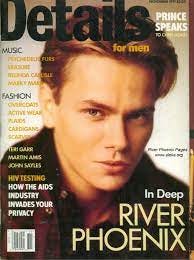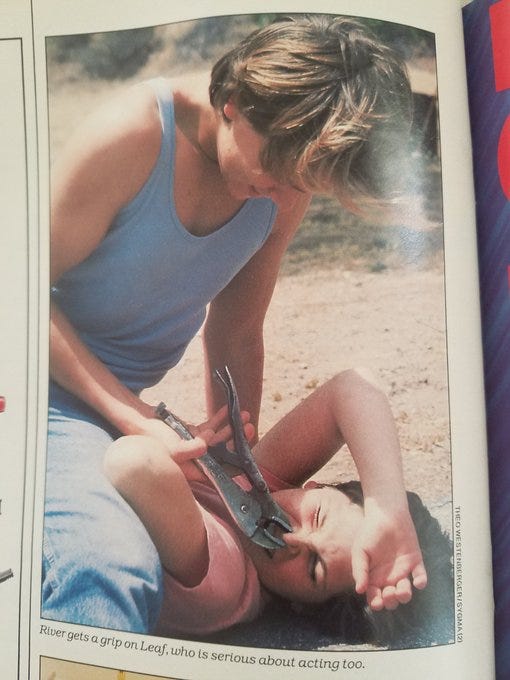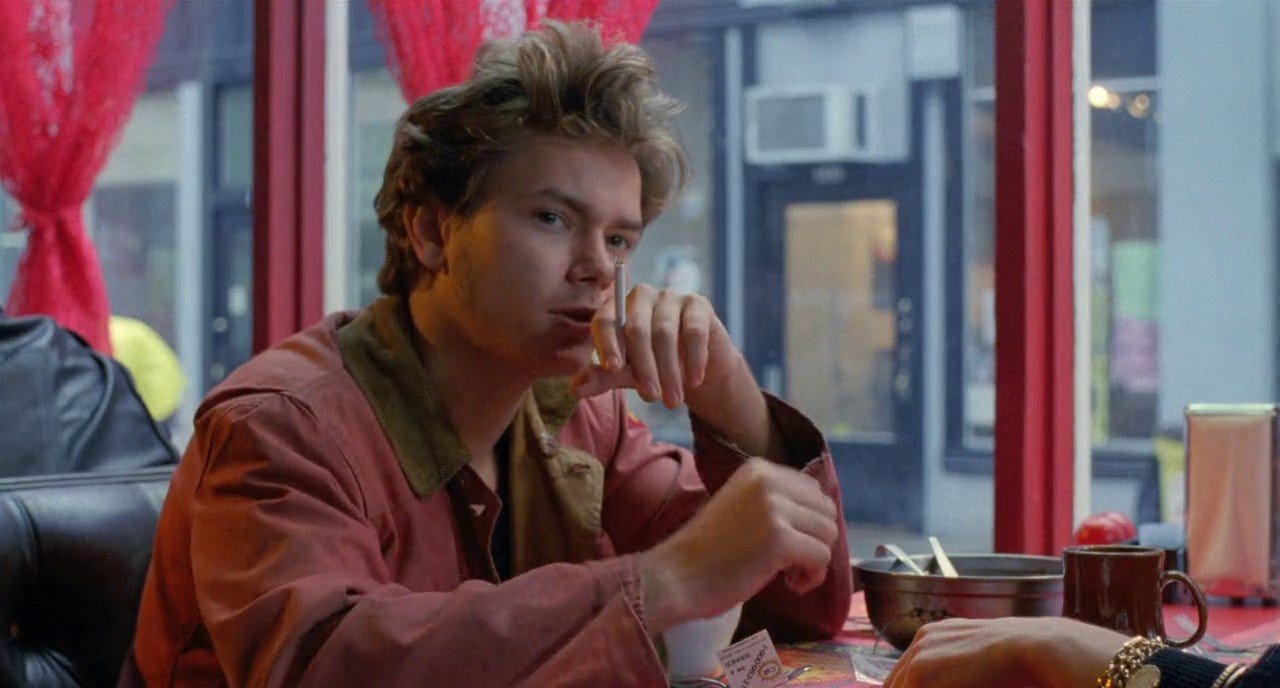Issue 2: The Myth of River Phoenix
How do you solve a problem like an enigmatic child actor gone too soon who the world continues to be obsessed with?
When the TikTok meme about men being obsessed with the Roman Empire went viral, a lot of people asked what the feminine equivalent was. There were many viable answers (shout out to my fellow Titanic nerds), but the one I kept coming back to was the Phoenix family. When I was a teenager in the mid-2000s, it felt like every adolescent girl I knew was, in some way, enamoured with River Phoenix and his family. The five siblings with the hippie child star upbringing was a tale that took on near-mythic qualities over the decades. At the centre of it all was River Jude, a prodigiously talented and astonishingly beautiful young man who set the film industry aflame before dying tragically young at the age of 23. It was an alluring story, one so embedded in the mystique of Hollywood as well as its darkness. Phoenix’s influence has loomed large over the past three decades of American cinema, from the enduring careers of contemporaries like Ethan Hawke and Leonardo DiCaprio to his impact on young stars like Timothee Chalamet to, of course, the work of his younger brother Joaquin.
We get many tributes to Phoenix every year upon the anniversary of his death, which occurred 30 years ago this past Halloween. So, we tend to see the same stories told over and over again, the same tiny handful of quotes regurgitated. River is now a face on t-shirts, a piece of iconography. I was three when he passed away so, to me and many others, he’s always been an image on the screen of unchanging allure. Going back and reading a lot of those old interviews from his youth, the ones I devoured as a teenager, the narrative cannot help but shift.
Details. "River's Edge." November 1991. Joe Dolce // Cleo. "River's Rise." May 1992. Michael Angeli.
(Old-school fansites have done an enviable job of collating old articles and interviews, and for that, we're eternally thankful! These scans are not easy to read just in terms of accessibility, so be warned.)
Content warning: This issue briefly touches upon themes of child sexual abuse.
Perhaps the most notorious quote ever given by River Phoenix is from a 1991 Details Q&A where he said he lost his virginity at the age of four. It is one of the key foundations of the Phoenix mythology. Every interview of any family member takes great pains to mention their unconventional births and the time they spent in the Children of God cult. Now known as The Family International, the cult has a dark history of child sexual abuse and a method of evangelism called Flirty Fishing that used sex to "show God's love and mercy." This has led to a lot of conspiracies around the Phoenix family, who got out of the cult pretty quickly once they discovered these reports. In this interview, Phoenix doesn’t describe “losing his virginity” as a toddler as abuse, although reading him saying he was “celibate” for a decade after cannot help but feel like a sick joke from someone dealing with some real troubles.
Joaquin later claimed that River was joking about this since, like his brother, he loved to screw around with interviewers who asked nosey questions. Whether or not you believe that is a whole other thing. It is true that River loved to mock interviewers and offer clearly trolling answers, but he could also be incredibly sincere. Across both the Details and Cleo pieces, you get the sense of a mature young man who is trying to cope with a level of fame that he clearly does not desire. To say “mature” still sounds like a joke. Remember, he’s barely 21 in the second interview. “Maturity” is a malleable concept when it comes to child stars. The film industry loves a precocious moppet who ages into someone they can wildly sexualize and shame at the same time. I know many a millennial woman who is still haunted by the tabloids who counted down the days until Emma Watson turned 16. We don’t see discussions of sexualizing young men in the same way as we do with famous young women, although as men like Justin Bieber can testify to, being fetishized as a sexpot when you’re barely old enough to consent does some strange stuff to your brain. Phoenix was always adored for his beauty, but also his status as somehow being “above” fellow child stars. It’s a lot to put onto the shoulders of a 20-year-old who has been paying the family bills full-time since pre-adolescence.
Before the interview takes place, the Details piece focuses on the oft-vaunted uniqueness of Phoenix. "Even if you don't know much about him, you probably know that this guy with the mythologically earthy name who enjoys eating tofu is a leather refusenik" is someone whose life, they admit, "make good copy." But they're also, Details emphasizes, symbols of his realness. He's not a poser. He "has staked out his own turf without waiving his convictions." Any profile about River is typically also about his family, not just in terms of lore but their presence. He’s photographed kissing his mother Arlyn (also known as Heart) in the Details piece. Other interviews feature his siblings or at least mention them in passing as part of the near-mystical clan of talented kids with unusual names. This also sets up the interview to follow, which is mostly comprised of silly answers from Phoenix. In fairness, the questions are pretty dull, all standard ‘90s interview stuff that’s a blend of banal and creepy (seriously, way too many journalists were too casual in asking strangers about their sex lives.) Joe Dolce asks Phoenix how to change one’s consciousness without drugs or alcohol, Phoenix responds, “Blowjobs… and music.” When he prods Phoenix on how it might be "risky" for him to play a gay character in My Own Private Idaho (his best film and performance), Phoenix dismisses it with "Man, that is so stupid."
There’s more tofu to chew on, so to speak, in the Cleo piece, where the interviewer goes to Gainesville, Florida, the official Phoenix hometown, and does a more traditional trail-and-talk profile. Michael Angeli seems especially eager to avoid the cliches fed to him by Phoenix's publicist. When reading a passage about how none of the Phoenix kids attend school (something most of them have denied, and River does so in this piece), he responds, "Enough already." Every interviewer wants to get the “real” story, the “real” subject, and even someone whose image was as unpolished and organic as Phoenix’s had someone selling a story to the masses to make it happen.
Reading stuff like this always makes the hindsight alarm go off in your head. You start piecing things together, hoping to find answers to what would follow. Were there clues to his troubles? For me, there are some Phoenix films I can’t rewatch, like Peter Bogdanovich’s The Thing Called Love, because he seems so evidently ill. Roger Ebert noted in his review of the film that "this performance in this movie should have been seen by someone as a cry for help." When you look at the Cleo piece, published 17 months before his death, you start wondering how much of his silliness is the result of something else. That’s obviously deeply unfair. Shock horror, people are allowed to be weird without anyone assuming they’re broken or intoxicated. That’s a problem that’s plagued Joaquin for decades with his own interviews.
Other profiles go more into River initially positioning himself as anti-drugs. A 1990 Vogue profile sees him condemn cocaine use, while the Cleo piece sees him refer to it as “the devil’s dandruff”, although he shares positive experiences with LSD. Part of what made his death so shocking, aside from his age, was that every interview and profile sold him to the world as anti-Hollywood, anti-drugs, and “clean.” Addiction spares nobody.
Stripped of that, both pieces show a perfectly sweet goofball who loves his work but hates the trappings of fame. Even Angelis, who seemed sceptical at first, is won over. In other interviews, he talks passionately about politics, such as the then-upcoming election of Bill Clinton and discrimination against gay people in the military. It’s all pretty relatable, which isn’t something often said of the Phoenix family. But then you remember that quote about him “having sex” as a four-year-old. Even if you believe that it was a joke, it sits uncomfortably in your stomach, another part of the Phoenix lore that builds to a tale of unbearable tragedy. Because that’s what the myth truly embodies: a tragedy. How could it not when, at its core, is the death of a 23-year-old from an overdose?
Every interview becomes a hunt for answers, a search for a timeline to pinpoint the moment where his life turned. Humans seek answers to the unanswerable. We’ve had three decades of tatty true crime specials, well-meaning books, and badgering of Joaquin in the hopes to solving the riddle. It’s not just Phoenix, of course. Any former child star who suffered tragedy is destined to be viewed as the victim of a curse, and such things are viewed as dishearteningly inevitable, as though it has to happen to young performers (I truly believe this is weaponized as a means to avoid legal changes that would further protect kids, especially in the current era of family influencers and social media fame.)
There is a temptation to victimize him, to deify him, to turn his death into a signifier of a generational shift. In death, we became a cautionary tale, as so many celebrities who died young do. It’s near-impossible to talk about his small but mighty filmography without getting stuck in the weeds of these myths. I wonder if he was ever just talked about for his talent, because the majority of interviews I read seemed more interested in further expanding the legend of his upbringing and vegan hippie image. Even the journalists who claim to want to subvert it cannot help but contribute to.
River Phoenix has now been dead longer than he’s been alive, a fact that is tough to truly swallow. The myth has long been set in stone. His family talked about him together for the first time for a 2020 60 Minutes interview. Joaquin named his son River, who was born in 2020, the same year Joaquin won the Best Actor Oscar and quoted his brother in his speech. I have a River postcard on my wall. Those who are so eager to “figure out” Phoenix will come up short when they look at interviews like these ones. Part of the myth exists because of that unknowability, and that makes our desire to know more endure. The flipside is that the real person never truly gets to be seen. In fairness, I’m not sure River Phoenix wanted everyone knowing all his business like that, and death sadly opened the floodgates for a barrage of invasions of privacy that continue to this day. You can find photographs of his dead body in his coffin online.
At the very least, I think the myth of River Phoenix should be an opportunity to get to know his work better, which might be the most interesting and fair way to understand a brilliant performer. Check out Stand By Me, My Own Private Idaho, and Running on Empty. Listen to the music he made under the banner of Aleka’s Attic. Look into the work done by the River Phoenix Center for Peacebuilding, an organization set up by his mother dedicated to restorative justice and the prevention of violence. Profiles hope to offer insights into that which fascinate us, but sometimes, it’s better to stick to what the subject wants us to.
Thanks for reading the newest issue of the Gossip Reading Club. You can check me out on BlueSky, Instagram, and Twitter. Most of my work can be found on Pajiba, including a review of Napoleon and my look into the latest Colleen Ballinger non-apology. I reviewed the first part of the last season of The Crown for The Wrap. I made my debut on Primetimer separating fact from fiction in The Crown and also celebrating Crashing, the comedy Phoebe Waller-Bridge made before Fleabag.
The first edition of Reading Hollywood, the Gossip Reading Club’s official book club, will kick off on December 16th. We’re looking into The Valley of the Dolls by Jacqueline Susann, which ought to be super-juicy (I haven’t read it since high school so I’m excited.) The book club will be a paid feature in the future but the first edition is free to all. Paid subscriptions also include This Week in Gossip, and future features like interviews, deep-dives into pop culture, and more!
If you don’t want to pay for a subscription but would still like to support me, I have a Ko-Fi account!










For a Gen X-er who watched River's come up in real time, this is about the best type of tribute that can be written about him.